13 Must-Try Israeli Street Foods: A Delicious Guide to Israeli Cuisine

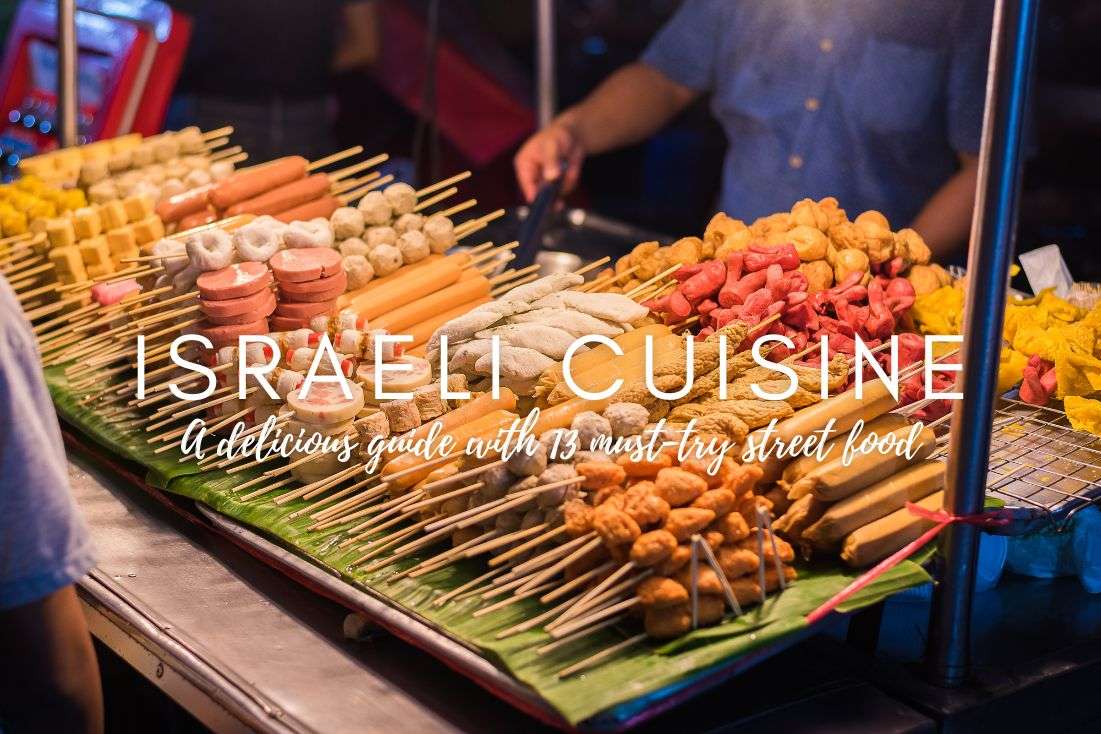
Israel must be one of the best countries I have been to when it comes to food. Middle Eastern cuisine is simply irresistible with all the meat, veggies, and desserts. In Israel, you can indulge in both traditional and modern culinary experiences, whether in the Old Town or amidst towering skyscrapers.
Doesn't matter if you're vegan or a meat lover, satisfying your taste buds with Israeli delicious dishes will be easy-peasy (vegan options are even more available than anywhere else). Welcome to the sunny streets of Israel, where the air is filled with tantalizing aromas and your sweet tooth is in for a treat (and maybe a cavity).
You could also be interested in reading:
- 3 days in Jerusalem: Itinerary That Will Keep You Busy!
- A Day in Tel Aviv: An Exciting 24-hour Itinerary Full of City’s Highlights
- 26 Things to Know Before Visiting Israel + 2 Surprising Don’ts
- Sacred Wonders: Discover 13 Unforgettable Holy Sites in Israel
1. Shakshuka
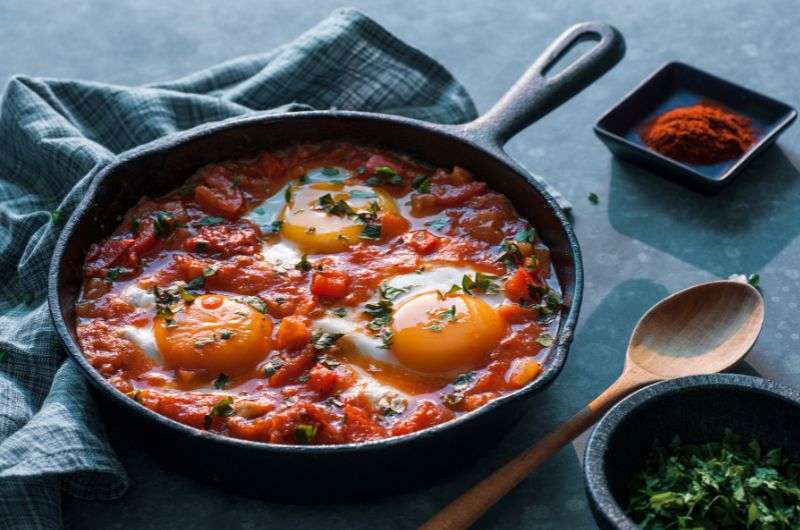
Shakshuka
Okay, let's begin with the crown jewel of Israeli cuisine. Shakshuka is a breakfast delight that made my taste buds dance with joy every morning. As I tasted one of the healthiest and best breakfast dishes ever on the first day of our trip, I immediately knew we would become best buddies. But what is shakshuka, you ask?
Well, it's nothing less than gently poached eggs in a rich tomato and pepper sauce accompanied by onions and garlic, served in a very hot sizzling pan. Don't you find yourself drooling just by reading this? I won't judge you; I've been there myself. The dish is that good-looking and smells incredible that I've burnt my tongue every time I've had shakshuka. I was so hasty and simply couldn't wait to eat it. And when the hot pan was served right in front of me, there was no time to wait!
You'll find shakshuka being served almost on every corner of Jerusalem or Tel Aviv. It's basically an Israeli national dish, winning the hearts—and stomachs—of both travelers and locals.
Shakshuka can be enjoyed in countless variations based on your preferences and taste. You can have the old but gold traditional recipe or spice it up a little bit with paprika or cumin. But whatever the combination, this mouthwatering delight is still culinary magic.
Tip: When it comes to breakfast, I'm one demanding fella. But the best breakfast shakshuka I've ever had was at Estate Spa Boutique Hotel in Rehovot. If you want to wake up to a delicious breakfast selection with fresh ingredients, that's the place for you (and obviously the sleep is good, too!).
2. Pomegranate fresh juice
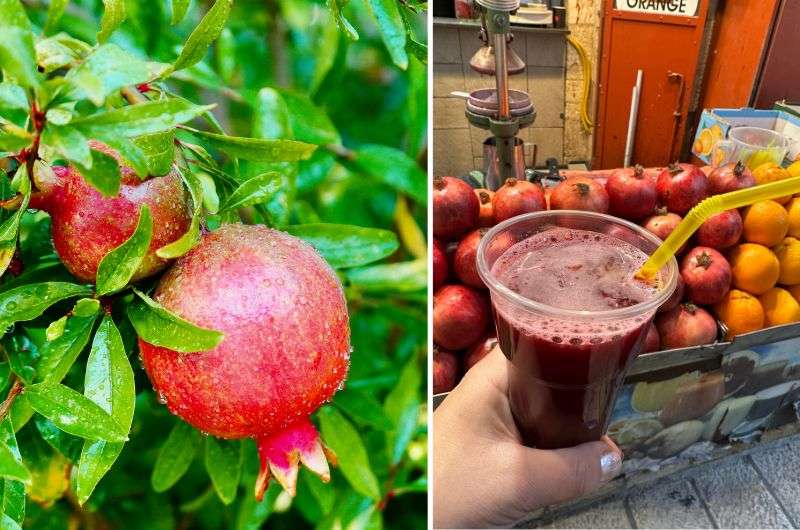
In Israel, pomegranate fresh is available on almost every corner
Me and pomegranate, that's a definition of a love-hate relationship. I love to eat it or drink its juice, but I hate to peel it and prepare it. And I don't know a single person who does. The process is a hassle and I'm not even talking about the mess. Luckily for me and all of you lazy peelers out there, there are flowing rivers of pomegranate juice on the streets of Israel. Figuratively speaking. So, you don’t have to do anything but enjoy your drink.
Not only is pomegranate fresh a treat for your sweet tooth, but it also has like a bazillion health benefits. Packed with antioxidants and essential nutrients, this delightful elixir is believed to promote heart health and boost immunity. And you can slurp 4 pomegranates in a minute, that's what I call efficient vitamin boost!
In Israel, pomegranates are something of a traditional fruit. It's a symbol of abundance, fertility, and prosperity. So, when you're enjoying a delicious treat, you also connect with cultural traditions and heritage. That's a win-win situation, and also one of my tips of what you should do in Israel.
The best juice I had was in Via Dolorosa in Jerusalem—a holy site which is believed to be walked by Jesus. Now I get why the juice tasted truly divine!
3. Shawarma
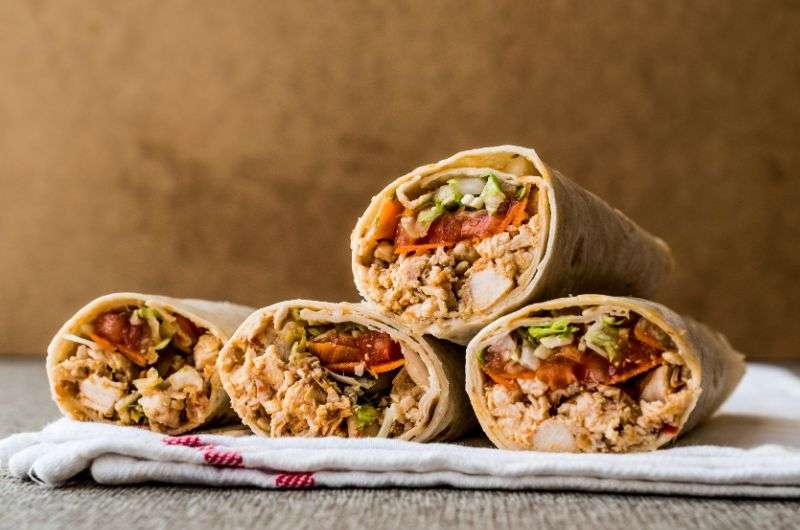
Shawarma
Well, what's not to like about thinly sliced, perfectly cooked meat? I know, I have exactly zero complaints. And people around the world would agree. This street dish is so popular that you can have it in almost every city in the world. Or at least one of its close variations from different cuisines, Greek gyros or Turkish kebab. It's all very similar and equally delicious.
You can imagine the well-known picture of a vertical cone-shaped mixture of meat on the stick spinning around next to the flaming hot grill that is being thinly sliced off as it cooks. And spinning, and spinning, and spinning… Sorry, I lost my focus while dreaming about the best shawarma I had in Jerusalem—the best ones are served in the Jewish quarter.

Getting Shawarama in Jerusalem
But shawarma is not only about meat—even though it's the key ingredient, it also needs some support. And that's where the sauces and toppings come into the picture. The vegetable served with the tender, juicy meat are almost as important. Fresh crisp lettuce with tomatoes and other vegetables with tahini, garlic sauce or spicy harrisa are the most common companions of the meat. All of this put together in fluffy warm pita bread or rolled in a laffa make the traditional shawarma.
4. Hummus
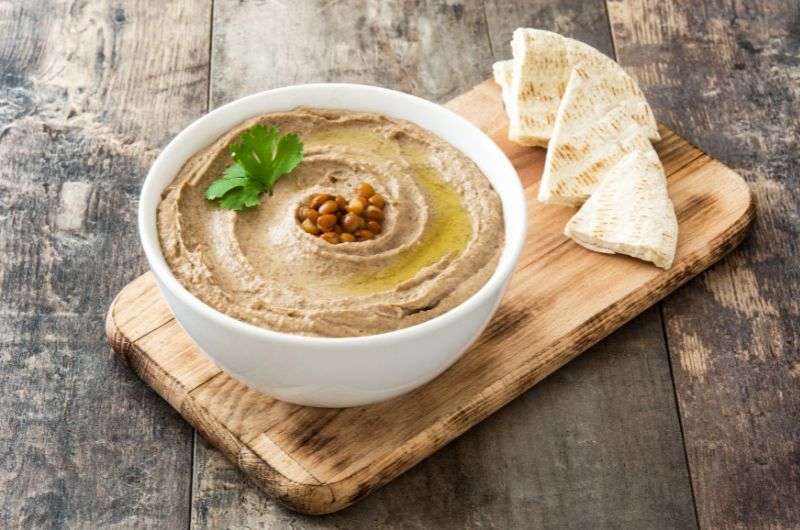
Hummus
I’ve loved hummus long before my travels to Israel. So, I naturally couldn’t wait what creamy sensation I'll get in the mecca of all hummuses. And what I got exceeded my expectations. While I was used to hummus being a side dish or more of a dip, in Israel they make it a whole dish! Served with whole hot chickpeas and warm pita bread, you can just dive your spoon in and eat it like any other vegetable puree.
Every hummus joint or restaurant serving it has a slightly different recipe or technique for how to make the perfect hummus spread. When traveling across Israel, you'll notice that some regions' recipe differs from others quite a lot.
But in general, the recipe stands on soaked and then cooked chickpeas, then blending them with tahini (a paste made from sesame seeds), lemon juice, garlic, and olive oil until they reach the right velvety-smooth consistency. The garnishes are the final touch, with some places offering everything from pine nuts and paprika to minced lamb or beef.
5. Baklava
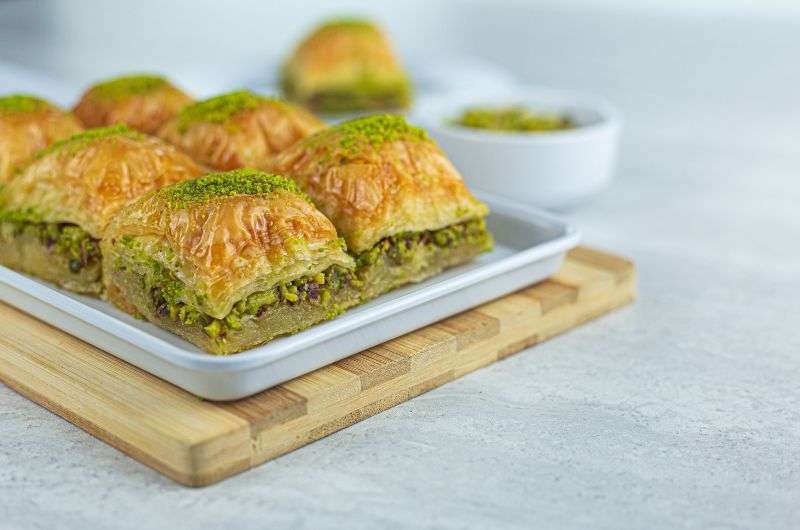
Baklava
Baklava is a godly pastry ready to satisfy your picky sweet tooth. It became probably my favorite dessert during my travels in Turkey and it sealed the deal in Israel, especially the one I bought at the street stand in Akko Old Town. And it’s even nothing fancy, heck it’s only some dough, nuts and syrup, but man oh man do they make them to-die-for!
The preparation requires patience, skill, and attention to detail—the process's what makes or breaks the baklava. Basically, the dough has to be the thinnest thing ever in order to make the finest layers of nuts (generally pistachios but can also be walnuts or hazelnuts) alternating with the dough. Douse in butter, bake.
The final step—soaking in a syrup, will make all your cavities sensitive, but your taste buds will experience golden perfection! It transforms the pastry to a heavenly dessert and gives the baklava the final sweet touch.
I can’t explain it, it was just so good! Make sure you’re eating fresh baklava and not the stale variety that has been packed forever, waiting for an unsuspecting tourist to buy it as a souvenir. If you see them cutting it up in front of your own eyes, you’re getting the good stuff.
You can get baklava at places dedicated just to the sweet or at restaurants as a dessert.
6. Knafeh
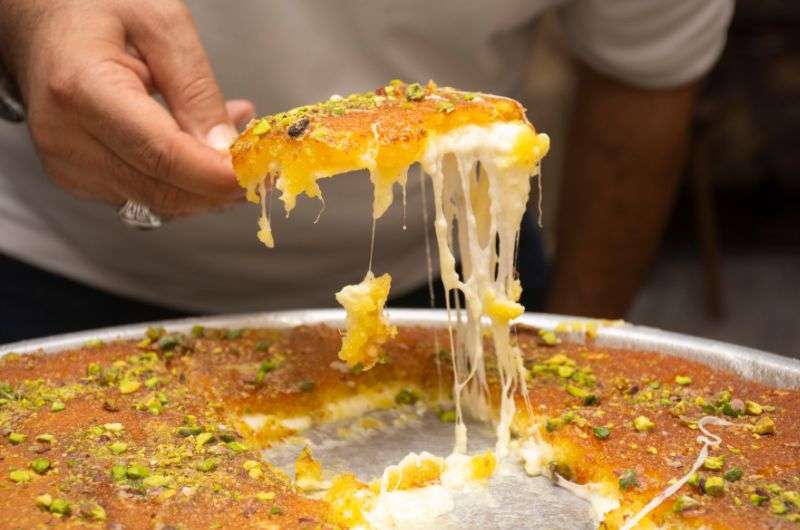
Knafeh
And I will continue with another sweet treat, one that will probably give you diabetes if you eat more than you should. I was particularly excited about knafeh, because I'm someone you could call a dessert critic and I was dared not to like it. I give anything sweet you put in front of me a harsh and honest evaluation, and I’m not easy to impress. But this one is *drumroll*… pure perfection.
I know, I've already said that baklava is the star of the best dessert show, but knafeh holds a close second place here. I'd never heard of it before I went to Israel and now? I can't visit the city without having a slice of a fresh knafeh. And how is this culinary bliss made?
The base is made from a special shredded pastry called kataifi, which is layered to create a nest-like structure. The cheese, typically a white, stretchy variety such as mozzarella or akkawi, is stuffed into the kataifi, adding a creamy and savory element to the dessert. Once baked to just the right crispy golden state, knafeh is generously soaked in a sweet sugar syrup infused with rose or orange blossom water—that's what lends it the floral aroma. The syrup seeps into the layers, creating a moist dessert that melts in your mouth with each bite.
I liked how the different tastes of sweet katafi with syrup and savory melted cheese work perfectly together, creating a unique flavor. I simply loved knafeh and everything about it.
7. Tabbouleh
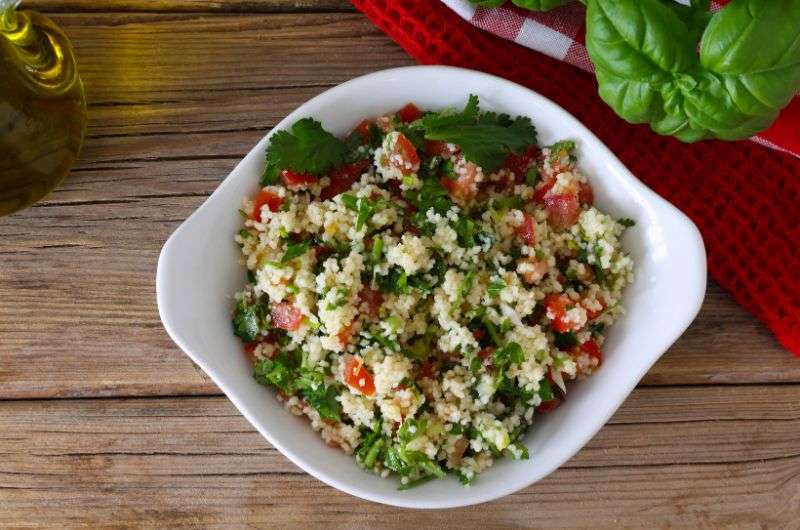
Tabbouleh
My love for tabbouleh reached new heights during my last Israel trip. I don’t know how the Israelis do it, but almost all of the dishes I tried there made it to the top of my list of favorite meals. And with my literal addiction to eating vegetables—at least five or six portions a day, tabbouleh had it way too easy to attract me.
Tabbouleh is a bowl filled with vibrant nutritious greens, fresh and juicy tomatoes and bulgur wheat. It's a salad that bursts with freshness, offering a delightful contrast of textures and many delicious flavors. The flavor that stands out from the dish is parsley—lots and lots of parsley.
The parsley is finely chopped with aromatic mint, fresh tomatoes and cucumbers, and bulgur. All tossed together makes the foundation of the salad. Now comes the dressing—simple yet effective. A drizzle of tangy lemon juice, a generous glug of extra virgin olive oil, and a pinch of salt to enhance the flavors.
And again, other ingredients differ from the region and cook. I once had tabbouleh with cilantro in it, which was probably the first and only time I didn’t like it that much. Another love-hate relationship here: Jan-cilantro.
Tabbouleh can be served as a side dish or the main course itself. It's the perfect accompaniment to grilled meats, or as a refreshing option on a warm summer day. You can enjoy tabbouleh in many versions, but it shouldn’t be missing on your culinary journey through Israel.
8. Falafel
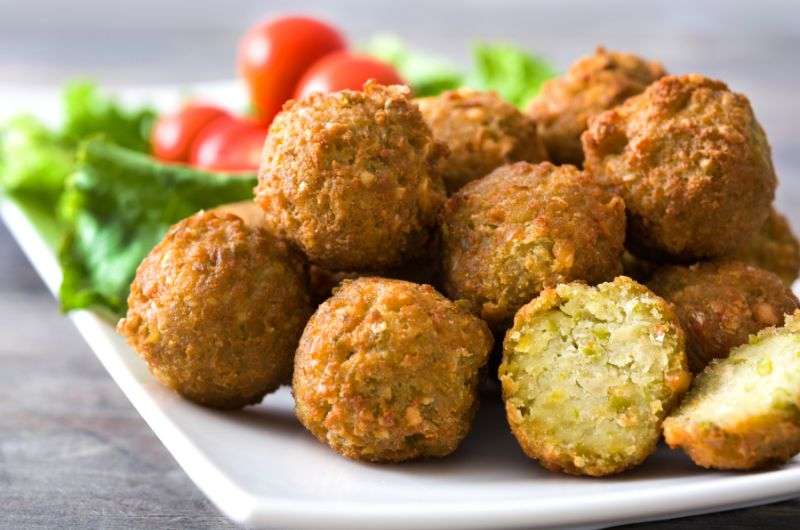
Falafel
Let me start by saying that falafel is a super strange meal for me. It really tries to seem healthy and all that, but it's fried. And you're not fooling me here, falafel. On the one hand, I love it, because it's made of chickpeas. On the other hand—the mixed feelings about being fried are still there, man.
Originating from the Levant region, falafel has become an iconic street food of Israel. When you wander through the busy crowded streets of Jerusalem or any other city in the region, you'll encounter many falafel stands—all giving off the aroma of freshly fried falafel. I had the best falafel that really got balls—you see what I did there—in Jerusalem's Falafel Uzi.
And what is this half healthy, half naughty meal made of? As I mentioned earlier, you'll mostly find falafel made out of chickpeas, but sometimes it can be replaced by fava beans. Whatever the main ingredient, it has to be soaked overnight and then blended with some herbs—mostly parsley, cilantro, and mint—and seasoned with cumin and garlic. This flavorful mixture with a kind of atypical texture is then formed into little balls or patties.
After the falafel is fried, the culinary craftsmanship doesn’t end. The falafel balls can be served in a warm pita bread—like probably everything they eat in Israel, with mainly fresh toppings, such as lettuce and tomatoes, or some pickles, all dripped by tahini sauce or a yogurt-based dressing.
9. Bourekas
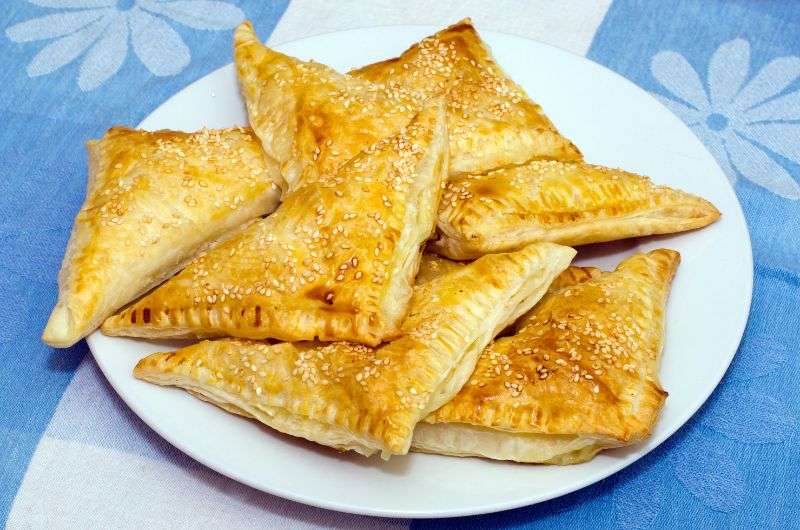
Bourekas
Bourekas is a savory pastry with two components. The whole secret is in the dough and the fillings. And that's it. They are sold everywhere in Israel and these little pockets of joy will leave you hooked and wanting more.
As for the fillings, oh boy, get ready for a flavor rollercoaster. Cheese lovers have to try some of the verified classics—feta, ricotta, or mozzarella. What beats the feeling of melted warm cheese in your mouth after the first bite? I can't think of a single thing right now. But if you prefer a veggie-filled pastry, try combinations like spinach and feta or mushroom and cheese—those hit the right tone with me as well.
There is a long tradition of small, filled savory pastries all over the world. You may have tried calzones in Italy, empanadas in Spain, or burek in Turkey. It's all based on the same principle, the same delicious principle. You can enjoy it for breakfast or just as a fast snack as a way to fuel yourself up for next stops on your busy Israel itinerary.
10. Tahini
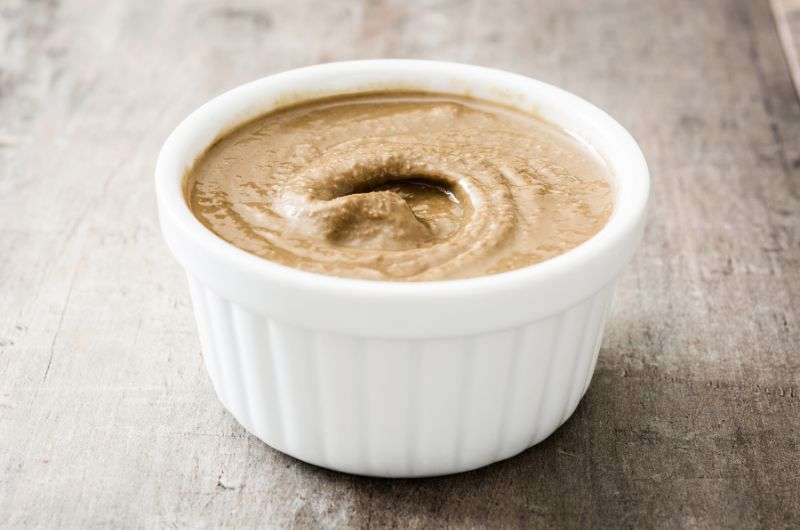
Tahini
The alfa and omega of Israeli cuisine must be none other than tahini. It's what elevates the dishes to the next level and gives them the final touch. A creamy, nutty wonder sauce that adds a twist to all meals.
Although tahini may sound as some complex master condiment that is an absolute game-changer of Israelis cuisine—which it is—it can't be easier to make it. It's just toasted sesame seeds grounded into a silky-smooth paste. That's it. (And maybe a bit of oil and sometimes salt, but who’s counting.)
Even though it's just sesame seeds, it's packed with healthy fats, protein, and even calcium, it's like a little jar of goodness for your body. And it's vegan, and gluten-free, so go ahead and indulge guilt-free. I actually don't care about these things, but there's literally no excuse for you not to try it.
Now, how can you enjoy this culinary gem? Get ready for some serious dipping and drizzling action! Tahini makes a mean partner for creamy hummus; one could say it's a match made in foodie heaven. Or hummus swiped right on Tinder once it saw tahini's profile—who knows. Spreading this iconic duo on warm pita bread or fresh veggies creates an instant flavor boost.
And because we're great friends, here's a pro tip for you: blend tahini with lemon juice, garlic, and a touch of honey for a killer salad dressing.
11. Malabi
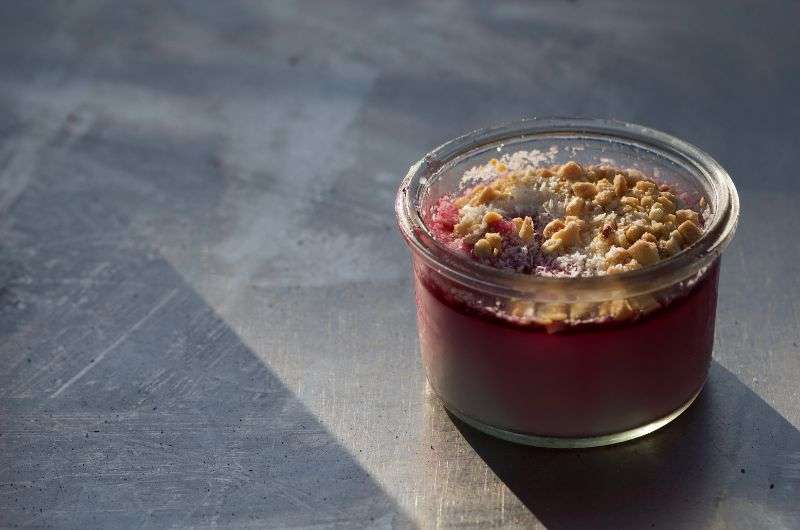
Malabi
Another famous dessert that stays engraved in my memory is malabi. The dessert is so good and sweet, it's served at weddings to symbolize the couple's sweet life ahead. How poetic and too damn delicious.
Malabi is a milk pudding, that's not very sweet on its own—the toppings make the difference. And also rose water, which leaves a very strong taste in it. Mostly, it's covered with a generous drizzle of fruity syrup—often a pomegranate one that complements the creamy base perfectly.
And let's not forget the finishing touch—a sprinkle of crushed nuts on the top. I like it when a dessert has a good crunchy element, so almonds or pistachios on malabi are a must for me.
In the winter, you can even try sachlav, a hot version of malabi with cinnamon and nuts.
12. Jerusalem mixed grill
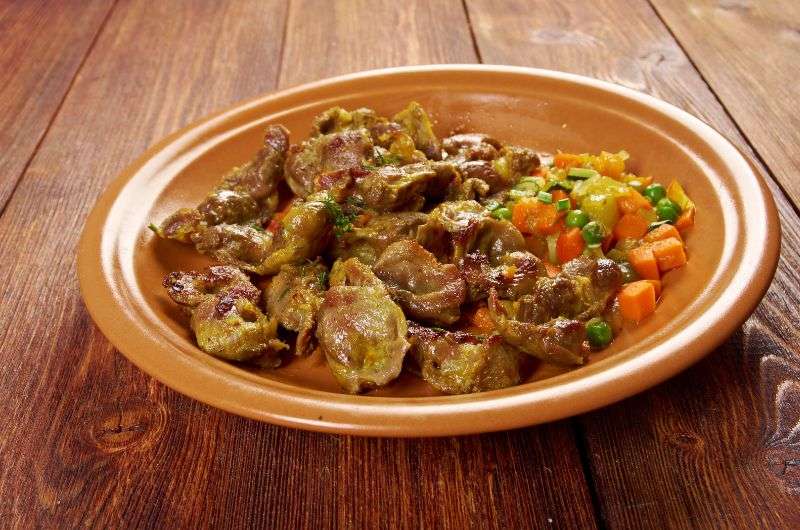
Jerusalem mixed grill
When I first saw Jerusalem mixed grill on the menu, I had no idea it was a kind of a meal. I mean, who names a dish that? It sounds like some kind of suspicious mixture from a grill bistro on the verge of bankruptcy in Jerusalem. But don't be fooled like I was, it's a meaty, mouthwatering symphony. I'm so poetic when it comes to food!
I'm a meaty person. I wouldn't survive a week without having a juicy steak or some grilled chicken. If you feel the same, you are in for a treat, my friend. Jerusalem mixed grill is a feast for meat lovers. The mix consists of chicken, lamb, and beef, all perfectly grilled and carefully seasoned.
Many restaurants and food stands now have their own variations of the dish, but the traditional recipe is based on chicken hearts and liver. Yummy, right? If you aren't a fan of chicken insides, feel free to skip this tradition and try a different variation.
Jerusalem mixed grill is usually served with some pita bread or vegetable salad.
13. Majadra
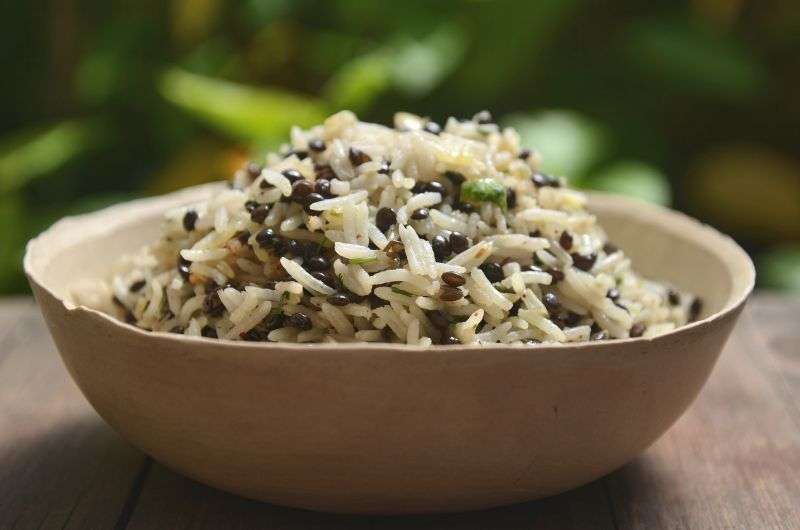
Majadra
Last but certainly not least, majadra. Majadra is a combination of lentils, cooked rice, and caramelized onions. Simple as that, but just as satisfying and tasty! And as almost everything else in Israeli cuisine—as you already figured out by now, is the right amount of spice. This time, the ones that give the special taste to majadra are cumin, cinnamon and allspice.
The history of majadra dates back many centuries. It's a humble dish without meat, made from cheap ingredients. That's why it used to be so popular among poor people and the popularity caused its widespread. Nowadays, there are plenty of variations in Arab world as every region adjusted the recipe to their resources and taste.
Best restaurants in Israel—places I recommend from my own experience
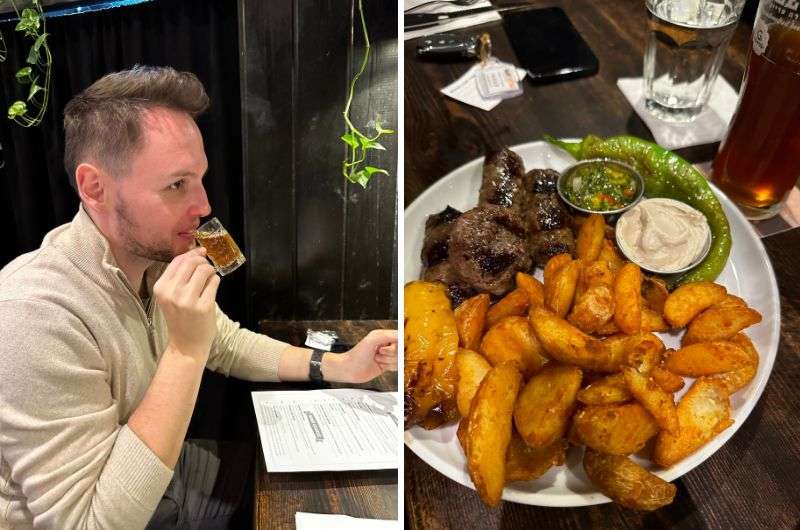
Enjoying the drinks and very delicious food in Moshbutz restaurant
I'm quite a foodie, so when it comes to restaurants, my recommendations are valid and their evaluation ruthless. Here are some restaurants, I enjoyed in Israel.
- Moshbutz: A great restaurant with exceptional steak and kebab. Even though it was a bit pricey, we got delicious food and excellent service from the friendly staff. And on the top of the whole experience, you get the best views of Sea of Galilee straight from your table!
- On The River: This restaurant made this list not only for the delicious chicken I had there, but also for its location. It is right at River Jordan at Yardenit—it's a holy site where it is believed that Jesus was baptized.
- Pergamon: A restaurant in Jerusalem with amazing vegetarian dishes. I enjoyed the many varieties of gin and tonic they had—even though my evaluation of the last ones I had is a little blurry. Kind staff!
- Falafel Uzi: I've already mentioned this one in the article, but I have to again. The best falafel I've ever had and not even that expensive. When you're in Jerusalem, it's a must-visit.
- The Culinary Workshop: Another great restaurant in Jerusalem. I actually don’t have anything negative to say about this place, we had excellent food, the service was absolutely struggle-free, and we got shots on the house. What else could you wish for?
This post contains affiliate links. I earn a small commission if you make bookings through my links, at no additional cost to you. This helps keep this blog free, thank you!










Comments | Thoughts? Give us a shout!